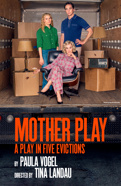With Mother Play, Celia Keenan-Bolger and Paula Vogel Turn 15 Years of Mutual Admiration Into Art

(Photos by Emilio Madrid for Broadway.com)
Paula Vogel gave Celia Keenan-Bolger a heads-up 15 years ago that she was writing a play with the actress’ voice in mind. They never discussed what the play was about or anything about the character Keenan-Bolger would one day—theoretically—be playing. When the piece finally hit her inbox last year, it caught her off guard. “As I started to read it, I was like, ‘Oh my God—I’m going to try to embody Paula.’”
Now running on Broadway at Second Stage’s Hayes Theater with direction by Tina Landau and Tony nominations for Vogel and all three of her stars, Mother Play is a largely autobiographical drama, the seed of which Vogel encapsulates in the question, “How do I say ‘Hi, Mom’ on stage after all of this time?” The piece reflects her fraught relationship with her mother, depicted as a volatile, alcoholic woman who moves their family from place to place while struggling to accept that both her children are gay.
"I even said to them, 'Do you think it's acceptable for me to play this part on Broadway?'" –Celia Keenan-Bolger
Vogel’s mother Phyllis (played by Jessica Lange) and brother Carl (played by Jim Parsons) have kept their real names in the production (in real life, Vogel has another brother, Mark). Keenan-Bolger’s character is the only one of the three with a new name—Martha, “which in some ways is me,” Vogel says tentatively in an interview for The Broadway Show with Broadway.com Managing Editor Beth Stevens. “In some ways.” Regardless of the playwright’s reticence to fully identify with the character she’s made the narrator of her family story, Keenan-Bolger felt pressure from the start to do justice to Vogel's essence on stage.
For one, she wasn't confident it was a story she had the right to tell. In a serendipitous parallel with the world of the play, she has two queer siblings—fellow Broadway actor Andrew and playwright-educator Maggie—and is sensitive to the debates surrounding representation and casting. "I even said to them, 'Do you think it's acceptable for me to play this part on Broadway?'" Aside from the political complexities of casting straight actors in queer roles, there's also a lived experience she knows she doesn't have. She remembers watching her younger siblings grow up and feeling "quite honestly, a little bit on the outside." She would think, "God, they really have their own language"—something she now gets to unpack from the inside in the dynamic between Martha and Carl.

(Photo: Joan Marcus)
And then there's the towering presence of Vogel herself. “The first thing everybody says is, ‘I love Paula Vogel,’” Keenan-Bolger stresses. “It’s both this enormous honor but also a massive responsibility. This feeling of not only getting to be part of a new play that she’s written, but also to have such proximity to her family—to the sort of inner workings of how this all went down in her childhood. It truly feels like one of the great gifts of my creative life.”
The feeling is mutual, with Vogel remembering the minute details of Keenan-Bolger’s performance in the very first reading of her eventually Tony-nominated play Indecent at the Sundance Theatre Lab in 2013. Vogel recalls being excited from the start, thinking with anticipation, “I get to work with Celia” (at that point, the actress had earned Tony nominations for her performances in The 25th Annual Putnam County Spelling Bee and Peter and the Statcatcher). For the lab, Keenan-Bolger was playing a Yiddish-speaking actress who, in one particular scene, is being replaced for an English production of a Yiddish play. “There were two words at the end of the scene,” Vogel recounts. “When she realizes she can’t stay, she draws herself up with dignity and says, ‘Goodbye, Lou’ using her very best English.’ I gasped and started to cry with the way she embodied two words.”

(Photo: Joan Marcus)
The fact that Vogel remembers that moment so vividly certainly speaks to the power of Keenan-Bolger’s ability to interpret text with heart and depth. But Keenan-Bolger also considers it a symptom of Vogel’s innately nurturing approach to collaboration. “I had never been with a collaborator like Paula,” she says. “It’s not to be believed.”
Vogel’s response: “I love everyone in my field and I just want to make sure that people know that I love them—that I love the things that work, and I love the things that don’t work.” Whether in a rehearsal room, a classroom or a living room, Vogel is the ultimate mother. “I’ve taught for 40 years,” she says, “and I cannot go out to a grocery store and buy for only two people.” In Vogel’s home, everyone gets fed.
And yet, “mother” is not a title she easily accepts. “That’s where I feel inauthentic,” she explains. “Like, how dare I—having not gone through 3AM feeding, cleaning up your child’s sickness, the terror of a scraped knee.” But if Mother Play conveys anything, it’s that mothering is a complicated act that takes many forms and usually demands forgiveness.
“I’ve never felt so at peace in the process of doing one of my plays,” says Vogel. “The healing began the first day. The first time these brilliant actors took on my words, I felt at peace.”



